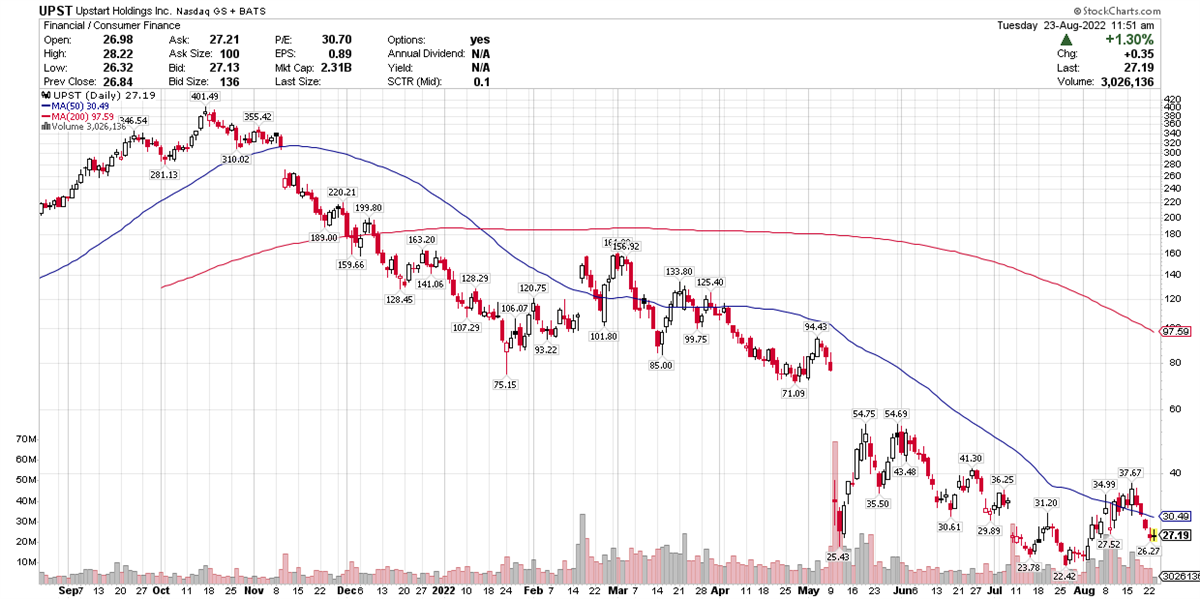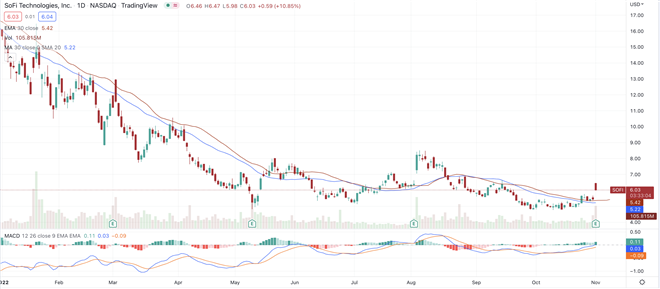Are These 2 Fintechs A Buy After Q2 Earnings? Fintechs Upstart and SoFi are well below previous price highs, but do these companies have potential over the long haul?
By Kate Stalter
Our biggest sale — Get unlimited access to Entrepreneur.com at an unbeatable price. Use code SAVE50 at checkout.*
Claim Offer*Offer only available to new subscribers
This story originally appeared on MarketBeat

Artificial intelligence-based lending platform Upstart Holdings (NASDAQ: UPST) was a pandemic-era winner, but has struggled since October of last year.
Other fintechs, including those with stadium naming rights - I'm looking at you SoFi Technologies (NASDAQ: SOFI) - are also well off previous highs.
Upstart, which uses AI tools to generate consumer and auto loans for banks, went public in December 2020. That was just in time to capitalize on stimulus money and low interest rates.
Upstart makes money in two ways. First, it receives fees from banks that pay for referrals. Potential borrowers apply through Upstart, and those leads are sent to banks.
Second, when the banks originate a loan using the Upstart platform integrated into their own mobile apps or Web sites, they pay a fee.
However, things haven't gone so smoothly once economic conditions began to change.
The stock is down an almost unbelievable 82.26% year-to-date. As bad as that sounds, it's actually trading above its late July lows. 
Lenders Demand Higher Margins
With interest rates now significantly higher than in 2021, lenders are taking more risk, and need to make more money from loans they make.
That put Upstart in a bad position of originating some unprofitable loans. Because the banks were not enthusiastic about this, Upstart opted to hold some of the loans itself, rather than selling them for a loss. However, Upstart's investors didn't want to be carrying these bad loans, so they sold the stock.
That caused the company to reverse course, but the damage was done.
In its second-quarter report on August 8, Upstart revealed that it earned $0.01 per share on a non-GAAP, down 98% from the year-earlier quarter. Revenue was $228.2 million, growth of 18%, but still a significant slowdown from triple-digit revenue growth in the past four quarters.
Those were misses on the top- and bottom line, according to MarketBeat earnings data.
In the earnings press release, CEO Dave Girouard said, "This quarter's results are disappointing and reflect a difficult macroeconomic environment that led to funding constraints in our marketplace."
Importantly, he also said, "He added: "In response, we're taking the necessary actions to build a more resilient and committed funding model over time. We're confident that our AI-based risk model is more accurate than ever, and provides the opportunity for long-term, sustainable growth."
Yes, it has the ring of protesting too much, to paraphrase the famous line from Hamlet.
Affected By Interest Rates
Rather than seeming like a cutting-edge AI company, Upstart now appears to be a company tied to the fortunes of the regular old financial system, changing interest rates and all. Shareholders are clearly not yet convinced that Upstart can fight its way out of the doldrums in the near future.
That doesn't necessarily mean it's permanently down for the count; it just means there's no evidence yet of a rebound on optimism about the company's immediate prospects.
Meanwhile, SoFi Technologies, whose name is plastered all over the Southern California stadium where the Los Angeles Rams and Chargers both play, has yet to turn a profit, and analysts don't see that happening any time soon.
While that may seem like shades of the Pets.com Super Bowl ad, there may be more to the SoFi story, which could make it appealing - eventually.
Unlike Upstart, SoFi serves as its own bank. It also operates an application programming interface (API) for payment services, card processing, digital banking and more. These capabilities are due to SoFi's 2020 acquisition of Galileo.
Topped Revenue Estimates
When SoFi reported earnings in early August, the stock gapped up 28.39% to $8.23, but it remains well below its November 2021 high of $24.65.
The company reported a loss of $0.12 per share, in line with views, according to earnings results compiled by MarketBeat. Revenue came in at $362.5 million, ahead of views calling for $346.39 million.
That revenue beat is a good indicator of the company's potential. While the prominence of a non-profitable company may seem risky at this time, SoFi may one to watch over the coming months and years.
Wall Street has a "moderate buy" rating on the stock, MarketBeat analyst data show. The price target is $13.73, an upside of 121.11%.
The decision to buy this stock, or not, requires some consideration. If you believe you can capture an upside of more than 100% in the next 12 to 18 months, then it may be worthwhile. On the other hand, if you see stocks with more immediate potential, you have to take the opportunity cost into account if you park your money in SoFi.









